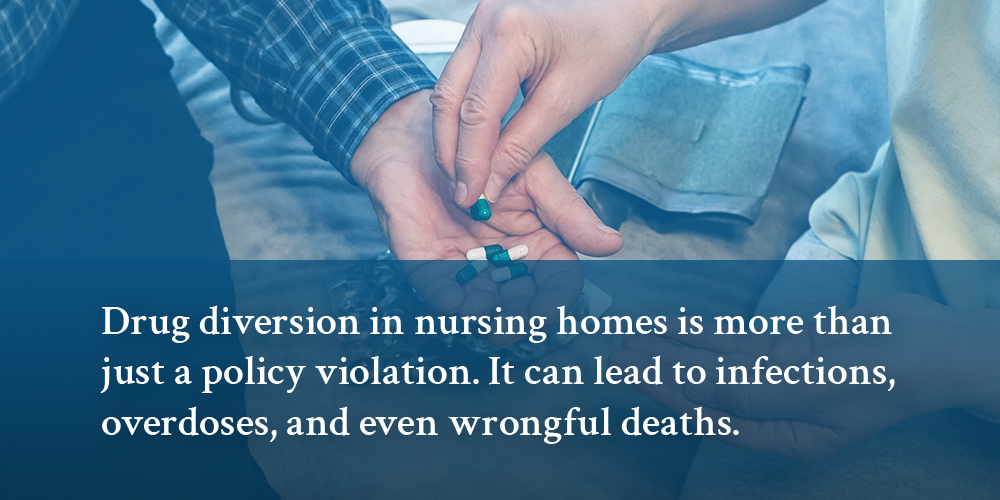
Try to imagine your loved one in an Illinois nursing home, deprived of painkillers, sedatives, or critical medications because staff members have stolen or misused them. The effects of nursing home drug diversion can be devastating to residents and their families. Not only is the practice of drug diversion unethical, but it can also lead to charges of nursing home abuse or neglect. Under the Illinois Nursing Home Care Act (210 ILCS 45), victims and their families may pursue civil claims.
If the drug diversion resulted in death, a wrongful death action may be warranted. Families with loved ones in nursing homes should know how drug theft happens and what proof is needed to show it. If you believe this may be happening to your loved one, talk to an experienced Peoria, IL nursing home abuse lawyer right away.
What Constitutes “Drug Diversion” in a Nursing Home?
Any theft, misuse, or misappropriation of prescription drugs is considered drug diversion. Some of the most common types of drug diversion in nursing homes include:
- Forging administration records to hide missing drugs
- Replacing medications with placebos or water
- Pocketing narcotics or sedatives
- Stealing medications from locked cabinets or automated dispensing systems
- Stealing medications from a resident’s belongings
- Substituting saline for an injectable opioid
- Diluting medications
- Failing to document the disposal of controlled substances properly
- Making unauthorized changes to verbal orders for controlled substances
Drug theft in nursing homes can happen for many reasons. Some staff may be addicted to painkillers. Others may take drugs because medication tracking is poor. It can also happen when there are not enough workers or when supervision is weak in Illinois facilities.
How Does Nursing Home Drug Diversion Harm Residents?
There are many ways that nursing home drug diversion harms residents. Older adults are among the most vulnerable residents, and drug theft is considered a serious form of abuse and neglect under Illinois law. Some of the more common ways that nursing home drug diversion harms residents include:
Patients Receive Inadequate or Compromised Medical Treatment
When a staff member steals a patient’s medication, the patient does not receive the required, prescribed treatment. This can lead to unnecessary pain, anxiety, and suffering, especially when the patient is taking opioid drugs for chronic pain.
Impaired Staff Members Provide Substandard Care
When staff steal drugs meant for residents, they might sell them or use them themselves. If they use the drugs, they could be impaired while working. This can cause them to be distracted, make poor choices, or make dangerous mistakes that can harm residents.
Residents Can Be Exposed to Dangerous Infections
When staff steal injectable drugs, they may reuse a resident’s syringe. This can spread dangerous diseases like HIV and Hepatitis C. The CDC has reported many infection outbreaks caused by drug theft. Using dirty or unsafe substances instead of clean ones can lead to sepsis, serious infections, and other health problems.
Tampering with Medical Records Can Increase Overdose Risks
Staff who steal drugs may change records to hide what they did. They might falsely write that a medication was given or safely thrown away. These false records can confuse other workers. Later, another staff member might give the wrong dose by mistake.
Drug Theft Can Cause Unnecessary Pain and Anxiety
A resident who has been denied pain medications because of drug theft may complain of unrelieved pain and is subsequently ignored or accused of addiction or “drug-seeking” behaviors. The discovery of drug theft can destroy the trust between residents, families, and staff. The resident can become withdrawn from the emotional distress and fear caused by needs not being met.
Actual Physical Harm Can Result from Drug Diversion
When residents miss their prescribed drugs, their pain, infections, and withdrawal symptoms can get worse. If they have a serious condition like diabetes or heart disease, their health can decline quickly. A resident who is supposed to receive heart drugs daily, but does not, could have a heart attack or a stroke. Missed doses of antibiotics, insulin, and heart medications can potentially be fatal.
Who Can Be Held Liable for Staff Drug Diversion?
The facility can be held responsible for poor hiring, weak supervision, or not locking up drugs safely. It can also be liable for what employees do while on the job. If a nurse, aide, or pharmacist steals drugs, they can be personally responsible. They could lose their license, face fines, or even criminal charges.
If bad record-keeping or poor drug tracking allows theft, the pharmacy company can also be blamed. Parent companies that ignore warning signs or fail to fund proper oversight can be held responsible, too.
Warning Signs of Illinois Nursing Home Drug Diversion
If a resident complains of pain that should be managed with medicine, it could be a sign of drug theft. Withdrawal symptoms can also be a warning. Frequent drug shortages or delays in refills are another clue. Watch for staff who refuse to give medicine when family is present. Sudden changes or stops in prescriptions can also mean drugs are being stolen.

What Damages Are Available to Residents and Family Members for Drug Diversion?
Victims can get money to cover medical costs now and in the future. They can also receive compensation for pain, suffering, and emotional distress. Punitive damages may be applicable as permitted in Illinois nursing home abuse cases under HB 0219 2023-2024. Attorney fees and costs may be recoverable under the Illinois Nursing Home Care Act. If a resident dies as a result of medication deprivation or overdose, the family may have a wrongful death claim.
Contact a Peoria County, IL Nursing Home Abuse Lawyer
If you suspect that a loved one’s medication has been stolen or tampered with in an Illinois nursing home, you must act quickly. An experienced Peoria, IL nursing home neglect attorney from Nursing Home Injury Center can investigate the incident, obtain pharmacy and facility records, and hold all liable parties accountable. As a small division of a much larger law firm, our clients received highly individualized attention while benefiting from the resources a big firm can offer. Call 309-524-6900 to schedule your free consultation.



